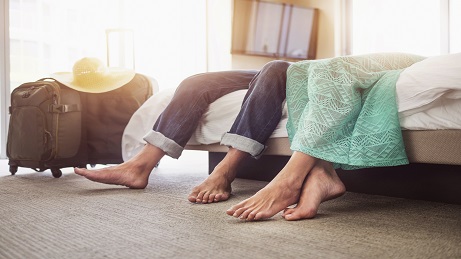
Lifestyle
Is your lifestyle stopping you from sleeping?
We all have bad habits. But could yours be stopping you from getting the rest you need? Whether you’re eating the wrong foods to aid good sleep , working shifts or need some tips to help nail down the perfect relaxing pre-bedtime ritual, take a look at the advice and actionable tips from our experts and resident sleep expert from Simba, Hope Bastine.
-
One
-
Two
-
Three
-
Four
-
Five

Is food keeping your child up at night?
Hope Bastine, Mindful Sleep Psychologist at Simba Sleep
The amount of sleep recommended per night varies with age: young children should have between 11 to 12 hours each night and teens need around 9 hours. But trying to get your children to sleep for this length of time can be difficult. What they eat throughout the day and before bed can have a surprising effect on how they sleep at night.
So here we share what foods to include in their diet and which to avoid, so your family can get a good night’s sleep.
A healthy breakfast means a healthy night’s sleep
A nutritious breakfast is essential to help your children get going in the morning. Without this, they can become tired, restless and irritable throughout the school day. If you have time, make them scrambled eggs on wholemeal toast, porridge or banana and greek yoghurt with a spoonful of honey. If you’re in a rush, cereal that’s high in fibre is a great alternative.
Dinner options to give them a good night’s rest
Chicken is a great option for dinner, as it contains high levels of tryptophan – which helps with our sleep hormone melatonin. Studies have also shown that eating fish - particularly ‘oily’ fish like salmon, mackerel and sardines - can lead to an improved quality of sleep. One theory is that the omega-3 fatty acids in oily fish help release melatonin.
Keep your child’s meals lighter closer to bedtime. Dinner time is also a great time to speak about their day, and address any worries or concerns they have before bedtime.
Avoid sugary snacks before bed
Sugary treats like chocolate contains stimulants that can keep your child awake. Chocolate contains both caffeine and refined sugar, which can disrupt their sleep. There are some foods and drinks that can help settle your child to sleep, such as a cereal or a drink of warm milk.

Shift workers: A guide to getting to sleep smart
Dr Eleanor Atkins, Clinical Fellow
Sticking to a regular sleep cycle can be tough, especially if you work shifts. You’re working against your body’s natural rhythm because you’re active and alert when you’re used to being asleep. So what you do before, during and after the shift can make a huge difference to your sleep and your general mood.
Not getting enough, regular sleep can affect our mood, concentration levels and overall health. Being sleep-deprived can also lead to an increase in hormones linked to stress, increase your risk of heart disease and high blood pressure and even affect your immune system. Not only this, working shifts when you’re tired can impact your concentration levels and may lead to accidents, depending on the industry you work in.
Fortunately, there are ways to cope with shift work. Try avoiding a heavy meal before you start your shift as this can make you sleepy. Instead, lighter meals and snacks are less likely to affect your alertness or cause drowsiness. Fruit and vegetables are good snacks too as their sugar is converted into energy relatively slowly. They also provide vitamins, minerals and fibre. Make sure you’re taking regular breaks too. And if you’re feeling tired, keeping the light bright can help you stay alert.
There are also a few things you can do to help manage your sleep pattern and help to make it as regular as you can:
Make your room dark, quiet and cool
Light and darkness are powerful cues that tell your body it’s time to rest, or get up. Although this can be difficult in the daytime, try to block the light out because this will help you sleep. Use heavy curtains or blackout blinds to darken your bedroom. Noise can also disrupt your sleep, so try to keep it to a minimum. If you live with other people and you need to sleep through the day, politely ask them to keep the noise down. Adjust your bedroom temperature to a comfortable level, as cool conditions can improve sleep too.
Let people know your schedule
Let friends, family and neighbours know your work schedule, so they can be considerate around the times you’re sleeping, to avoid your sleep being disturbed.
Avoid stimulants before bed
If you can, try to avoid caffeine, energy drinks and other stimulants a few hours before bedtime , as these can stop you from sleeping.
Unwind before bed
You may need time to unwind between work and bedtime. Try to relax by going for a short walk, relaxing with a book or having a hot bath.

Nutrition – Foods to help you drift off
Hope Bastine, Mindful Sleep Psychologist at Simba Sleep
Everyone has trouble sleeping from time to time. Amongst other factors, what we eat and drink can affect how we power down for the night. So here we share what foods to include for a good night’s sleep and what to avoid.
Foods to include...
Try to eat a balanced and varied diet full of fresh fruits, vegetables, whole-grains and low-fat protein sources.
Foods that contain a lot of tryptophan (an amino acid) may also help with sleep. These can be found in protein-rich foods like turkey, chicken and tofu. Some experts think that foods such as tofu, steak and chicken, combined with nuts and rice, can help you achieve a good night’s sleep.
Studies have shown that eating fish, particularly ‘oily’ fish like salmon, mackerel and sardines, has lots of health benefits. These foods are rich in special types of fat called omega-3s which are important for your heart and brain. A recent study has also shown that eating omega-3 can also lead to improved quality of sleep, but this needs exploring more to be confirmed as completely accurate.
Foods to avoid...
There are also some foods and drinks that can disturb our sleep. Sugars, caffeine and other stimulants like energy drinks can disrupt your sleep and keep you awake. So try to avoid caffeine in the six hours before you go to bed.
In the evening, you should avoid eating meals that have a lot of fat or spice, as these can cause indigestion. And avoid large meals late in the day because this might make it harder to fall asleep too.
Consuming too much sugar may also affect your sleep. The more sugar you eat during the day, the more often you’re going to wake up in the middle of the night. And even if you don’t fully wake up, the sugar in your system can pull you out of a deep sleep, making you feel exhausted the next day.
Alcohol also impacts your sleep and often can keep you awake. It may make you sleepy, but it can stop you from falling into a deep sleep and cause you to wake up during the night. You should also watch how much liquid you have before bed, as drinking too much can make us wake up to go to the toilet.

Can getting more sleep improve my lifestyle?
Ana Noia, Senior Clinical Physiologist in Neurophysiology and Sleep at Cromwell Hospital
Not getting enough sleep can affect you in many different ways. After a bad night’s sleep, you might see the effects the next day through paler skin, red eyes or ‘bags under your eyes’. And not only can sleep deprivation take its toll on how you look, but it can also impact your overall health and wellbeing. So it’s important we give our bodies the chance to rest.
Here we share some tips on improving your sleep health and how you can use sleep to stay at the top of your game.
Diet and exercise
Following a healthy diet and doing regular exercise is often given as a golden rule to help with a lot of health issues. And getting a good night’s sleep is no exception. Exercise can help with the quality of sleep and may help you drop off more quickly. It’s also known to increase the total time you sleep for, and generally benefits your sleeping pattern because it helps us to feel more tired in the evening.
Tip: Don’t exercise too late though, as this can make you feel more alert and awake when you’re trying to wind down.
What you eat is also a major player in getting a good night’s sleep. Protein-rich foods such as turkey, chicken and tofu contain a type of amino-acid which helps with sleep. Try to avoid large meals late in the day because this might make it harder to fall asleep too.
Sleeping well is good for your mind too
Sleep deprivation is common in people who suffer from mental health disorders such as anxiety, depression, bipolar disorder and ADHD (attention deficit hyperactivity disorder).In some cases, treating a sleep problem can ease the symptoms of mental health problems.
Sleep and mood are inter-related. If you have a poor night’s sleep, you can often cause a low mood and feelings of anger and irritability. You might also find it harder to cope with stressful situations.
So getting the sleep you need to wake up feeling refreshed and renewed will also help you to stay happy too.
So, how can I get a good night’s sleep?
The key to getting a good night’s sleep is to only go to bed when you’re feeling tired and sleepy. If you go before, you might find yourself lying there awake thinking about negative situations about not falling asleep, leaving you feeling stressed and keeping yourself awake for longer.
How to keep going if you’re feeling tired
Whilst we recommend getting a good night’s sleep, it’s common for everyone to have a disturbed night’s sleep from time to time. And when this does happen it can be difficult to stay motivated the next day.
If you’re feeling tired and grumpy, it’s important to try and keep going with your normal routine. Sticking to a balanced diet, exercising and avoiding drinking too much alcohol will help you maintain a healthy lifestyle and get back to your normal sleeping habits.

How to get a good night’s sleep
Ana Noia: Senior Clinical Physiologist in Neurophysiology and Sleep at Cromwell Hospital
It’s the formula that everyone wants – the ability to have the perfect night’s sleep. Who doesn’t want to wake up feeling refreshed and renewed, ready to tackle the day? Some are able to fall asleep as soon as their head touches the pillow, but for others this is a distant dream.
Having lots of sleepless nights can start to take its toll on you. And over an extended length of time, can even lead to health problems.
Here we go through some of the simple things you can try to help you get a good night’s sleep.
Look at where you’re sleeping
If you’re having sleepless nights, your first port of call should be your bedroom. This all-important room needs to be set up for relaxation to give you the best chance of the sleep you want.
Ask yourself the following things to see if your bedroom is designed for a restful night:
- Do you have a comfortable mattress?
- Is your bedroom too hot or too cold?
- Are there noises disturbing your slumber?
- Is there any lighting nearby that might wake you up?
- Do you use electronics, screens or gadgets before you go to sleep?
Develop a routine that works for you
Our bodies love routine. So if you ever change your sleeping routine, our bodies don’t like it! Sleeping in late for a few days in a row, or having late nights can leave your body feeling a bit muddled. Try sticking to the following:
- Try going to bed and getting up at roughly the same time every day.
- While weekend lie-ins are tempting for all, they can make getting up on a Monday harder. Try planning something fun to do at the weekend to get you up and out.
- Don’t nap during the day. If you feel you really need to, keep it between 20 and thirty minutes.
- Create a nice, relaxing pre-bedtime routine to help yourself wind down.
Eat for the sleep you want
The food and drinks we eat over the course of the day can affect our energy levels and how well we sleep at night. Avoiding or limiting the following will help you get the undisturbed hours of sleep you want:
- Caffeine – say goodbye to tea, coffee and energy after mid-afternoon to avoid them keeping you awake
- Alcohol – whilst it might feel like a glass of wine helps you to relax and nod off, the reality is that it can actually interfere with your sleep and wake you up in the night.
- Sugary foods and heavy meals – eating too late can affect how well you sleep, so having your dinner too close to bedtime may disrupt the way you sleep. Try to eat as early as possible.
Stop your lifestyle from keeping you up at night
Do you think your lifestyle is stopping you from getting the sleep you need? Try some of our tips to make a start; after all, your body needs a good night’s rest to help you function. And if lack of sleep becomes a long-term problem, it can lead to more serious health conditions.
Interested in doing more to help you sleep better?
Do you think feelings of stress might be stopping you from sleeping? Take a look over our stress advice and tips for helping you get to sleep.
For getting the help you need faster
Our health insurance is there to help you deal with health issues big and small, sooner rather than later.


